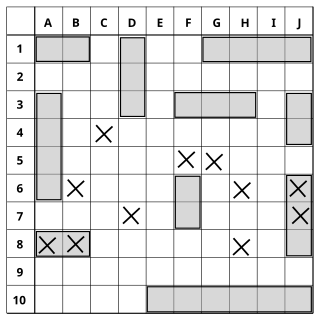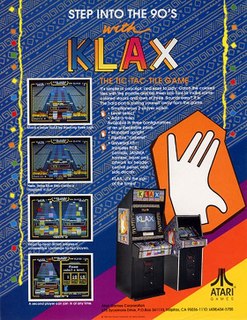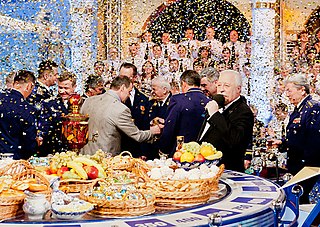Hangman is a guessing game for two or more players. One player thinks of a word, phrase or sentence and the other(s) tries to guess it by suggesting letters within a certain number of guesses. Originally a Paper-and-pencil game, there are now electronic versions.

Scrabble is a word game in which two to four players score points by placing tiles, each bearing a single letter, onto a game board divided into a 15×15 grid of squares. The tiles must form words that, in crossword fashion, read left to right in rows or downward in columns and are included in a standard dictionary or lexicon.

Puzzle video games make up a broad genre of video games that emphasize puzzle solving. The types of puzzles can test problem-solving skills, including logic, pattern recognition, sequence solving, spatial recognition, and word completion.

Battleship is a strategy type guessing game for two players. It is played on ruled grids on which each player's fleet of warships are marked. The locations of the fleets are concealed from the other player. Players alternate turns calling "shots" at the other player's ships, and the objective of the game is to destroy the opposing player's fleet.

Klax is a puzzle video game released in arcades in 1990 by Atari Games while Namco distributed the game in Japanese markets. It was designed by Dave Akers and Mark Stephen Pierce. The object is to catch colored blocks tumbling down a machine and arrange them in colored rows and patterns to make them disappear. Klax was originally published as a coin-op follow-up to Tetris, about which Atari Games was in a legal dispute at the time.

Des chiffres et des lettres is a French television programme. It was created by Armand Jammot and tests the numeracy skills and vocabulary of two contestants. It is one of the longest-running game shows in the world, and the inspiration for Countdown on Britain's Channel 4.

Now You See It is an American television game show created by Frank Wayne for Mark Goodson-Bill Todman Productions. The object of Now You See It is to answer general knowledge trivia questions by finding the answers hidden in a grid, similar to a word search puzzle.

Smash TV is a 1990 arcade video game created by Eugene Jarvis and Mark Turmell for Williams Electronics Games. It is a dual-stick shooter in the same vein as 1982's Robotron: 2084. The Super NES, Genesis, Master System, and Game Gear versions are titled Super Smash TV.

Wordtris is a Tetris offshoot designed by Sergei Utkin, Vyacheslav Tsoy and Armen Sarkissian and published by Spectrum HoloByte in 1991 for MS-DOS compatible operating systerms. A port to the Game Boy, by Realtime Associates, and Super Nintendo Entertainment System were released in 1992.

Get the Picture is an American children's game show that aired from March 18 to December 6, 1991, on Nickelodeon. Hosted by Mike O'Malley, the show features two teams answering questions and playing games for the opportunity to guess a hidden picture on a giant screen made up of 16 smaller screens. The show was taped at Nickelodeon Studios at Universal Studios in Orlando, Florida. The program's theme music and game music was composed by Dan Vitco and Mark Schultz, and produced by Schultz. Its tagline is The Great Frame Game.

Wheel of Fortune is an American television game show created by Merv Griffin, premiering in 1975 with a syndicated version airing in 1983. Since 1986, the syndicated version has been adapted into various video games spanning numerous hardware generations. Most versions released in the 20th century were published by GameTek, which filed for Chapter 11 bankruptcy protection in 1998.

Wheel of Fortune is an Australian television game show produced by Grundy Television until 2006, and CBS Studios International in 2008. The program aired on the Seven Network from 1981 to 2004 and January to July 2006, aired at 5:00pm from 1981 to 1989 and from 2004 to 2006 and at 5:30pm from 1989 to 2003, and is mostly based on the same general format as the original American version of the program.

Pole Chudes is a Russian adaptation of the U.S. game show Wheel of Fortune produced by VID, provided with elements of Russian culture and hosted by Leonid Yakubovich. Current rating of the show suggests it is intended for ages 16 and above, unlike the American version which is suitable for all age groups. Channel One Russia currently intends to stop buying Pole Chudes from VID and replace it with a licensed version of Wheel of Fortune under the same name since January 2022. Originally, due to a trademark dispute with VID, the title of the new show was supposed to be Nashe Pole Chudes, however, VID later agreed to let Channel One keep the original Pole Chudes name and the full 31-year archive, while Channel One will be producing the new reboot of the show as a licensed spin-off of Wheel of Fortune.

TV Slagalica or simply Slagalica is a Serbian quiz show produced by RTS and airs on RTS1. It is based on Des chiffres et des lettres, a French game show. It first aired on 22 November 1993. at 7 pm. It consists of seven simple mind games. Contestants play for a spot in the quarter finals, semi finals and then the finals. Contestants win prizes as they progress. It has four female hosts: Marija Veljković, Kristina Radenković, Milica Gacin and Jelena Simić. After the end of each 10th series, winners of each of the previous 10 series', with the addition of 6 runners-up, play in the superfinal using the same system as a regular series. In the superfinal, there is also an additional game played.
Lykkehjulet is the Danish version of the Wheel of Fortune television game show. Airing in 1988, the show was the first big American game show to be imported to Denmark and it was one of the first successes for Danish broadcaster TV2 when it became Denmark's second TV channel in 1988.

Shanghai is a computerized version of mahjong solitaire published by Activision in 1986 for the Amiga, Atari ST, Atari 8-bit family, Commodore 64, IBM PC, Macintosh, Apple IIGS and Master System. Shanghai was originally programmed by Brodie Lockard. It was released as an arcade game by Sunsoft in 1988.

The Computer Edition of Scrabble is a computer game developed by Leisure Genius for the Macintosh in 1988, and was an official computerized version of the board game Scrabble.

Wheel of Fortune is an American television game show created by Merv Griffin. The show has aired continuously since January 1975. The show features a competition in which contestants solve word puzzles, similar to those used in hangman, to win cash and prizes determined by spinning a giant carnival wheel. The current version of the series, which airs in nightly syndication, premiered on September 19, 1983. It stars Pat Sajak and Vanna White as host and co-host. The original version of Wheel was a network daytime series that originally ran on NBC from January 6, 1975, to June 30, 1989, and subsequently aired on CBS from July 17, 1989, to January 11, 1991; it returned to NBC on January 14, 1991, and was cancelled that year, ending on September 20, 1991.

Scrabble Showdown was an American game show created for the American cable network The Hub. The program was based on the board game Scrabble and was hosted by Justin Willman. It ran from September 3, 2011 to April 15, 2012.

Hangman is a video game based on the pen-and-paper game of the same name released in 1978 by Atari, Inc. for the Atari VCS.

















